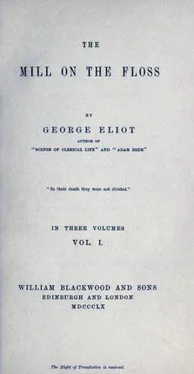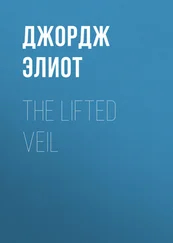"Perhaps not," said Maggie, simply; "but then, you know, the first thing I ever remember in my life is standing with Tom by the side of the Floss, while he held my hand; everything before that is dark to me. But I shall never forget you, though we must keep apart."
"Don't say so, Maggie," said Philip. "If I kept that little girl in my mind for five years, didn't I earn some part in her? She ought not to take herself quite away from me."
"Not if I were free," said Maggie; "but I am not, I must submit." She hesitated a moment, and then added, "And I wanted to say to you, that you had better not take more notice of my brother than just bowing to him. He once told me not to speak to you again, and he doesn't change his mind — Oh dear, the sun is set. I am too long away. Good-by." She gave him her hand once more.
"I shall come here as often as I can till I see you again, Maggie. Have some feeling for me as well as for others."
"Yes, yes, I have," said Maggie, hurrying away, and quickly disappearing behind the last fir-tree; though Philip's gaze after her remained immovable for minutes as if he saw her still.
Maggie went home, with an inward conflict already begun; Philip went home to do nothing but remember and hope. You can hardly help blaming him severely. He was four or five years older than Maggie, and had a full consciousness of his feeling toward her to aid him in foreseeing the character his contemplated interviews with her would bear in the opinion of a third person. But you must not suppose that he was capable of a gross selfishness, or that he could have been satisfied without persuading himself that he was seeking to infuse some happiness into Maggie's life, — seeking this even more than any direct ends for himself. He could give her sympathy; he could give her help. There was not the slightest promise of love toward him in her manner; it was nothing more than the sweet girlish tenderness she had shown him when she was twelve. Perhaps she would never love him; perhaps no woman ever could love him. Well, then, he would endure that; he should at least have the happiness of seeing her, of feeling some nearness to her. And he clutched passionately the possibility that she might love him; perhaps the feeling would grow, if she could come to associate him with that watchful tenderness which her nature would be so keenly alive to. If any woman could love him, surely Maggie was that woman; there was such wealth of love in her, and there was no one to claim it all. Then, the pity of it, that a mind like hers should be withering in its very youth, like a young forest-tree, for want of the light and space it was formed to flourish in! Could he not hinder that, by persuading her out of her system of privation? He would be her guardian angel; he would do anything, bear anything, for her sake — except not seeing her.
Chapter II. Aunt Glegg Learns the Breadth of Bob's Thumb
While Maggie's life-struggles had lain almost entirely within her own soul, one shadowy army fighting another, and the slain shadows forever rising again, Tom was engaged in a dustier, noisier warfare, grappling with more substantial obstacles, and gaining more definite conquests. So it has been since the days of Hecuba, and of Hector, Tamer of horses; inside the gates, the women with streaming hair and uplifted hands offering prayers, watching the world's combat from afar, filling their long, empty days with memories and fears; outside, the men, in fierce struggle with things divine and human, quenching memory in the stronger light of purpose, losing the sense of dread and even of wounds in the hurrying ardor of action.
From what you have seen of Tom, I think he is not a youth of whom you would prophesy failure in anything he had thoroughly wished; the wagers are likely to be on his side, notwithstanding his small success in the classics. For Tom had never desired success in this field of enterprise; and for getting a fine flourishing growth of stupidity there is nothing like pouring out on a mind a good amount of subjects in which it feels no interest. But now Tom's strong will bound together his integrity, his pride, his family regrets, and his personal ambition, and made them one force, concentrating his efforts and surmounting discouragements. His uncle Deane, who watched him closely, soon began to conceive hopes of him, and to be rather proud that he had brought into the employment of the firm a nephew who appeared to be made of such good commercial stuff. The real kindness of placing him in the warehouse first was soon evident to Tom, in the hints his uncle began to throw out, that after a time he might perhaps be trusted to travel at certain seasons, and buy in for the firm various vulgar commodities with which I need not shock refined ears in this place; and it was doubtless with a view to this result that Mr. Deane, when he expected to take his wine alone, would tell Tom to step in and sit with him an hour, and would pass that hour in much lecturing and catechising concerning articles of export and import, with an occasional excursus of more indirect utility on the relative advantages to the merchants of St. Ogg's of having goods brought in their own and in foreign bottoms, — a subject on which Mr. Deane, as a ship-owner, naturally threw off a few sparks when he got warmed with talk and wine.
Already, in the second year, Tom's salary was raised; but all, except the price of his dinner and clothes, went home into the tin box; and he shunned comradeship, lest it should lead him into expenses in spite of himself. Not that Tom was moulded on the spoony type of the Industrious Apprentice; he had a very strong appetite for pleasure, — would have liked to be a Tamer of horses and to make a distinguished figure in all neighboring eyes, dispensing treats and benefits to others with well-judged liberality, and being pronounced one of the finest young fellows of those parts; nay, he determined to achieve these things sooner or later; but his practical shrewdness told him that the means to such achievements could only lie for him in present abstinence and self-denial; there were certain milestones to be passed, and one of the first was the payment of his father's debts. Having made up his mind on that point, he strode along without swerving, contracting some rather saturnine sternness, as a young man is likely to do who has a premature call upon him for self-reliance. Tom felt intensely that common cause with his father which springs from family pride, and was bent on being irreproachable as a son; but his growing experience caused him to pass much silent criticism on the rashness and imprudence of his father's past conduct; their dispositions were not in sympathy, and Tom's face showed little radiance during his few home hours. Maggie had an awe of him, against which she struggled as something unfair to her consciousness of wider thoughts and deeper motives; but it was of no use to struggle. A character at unity with itself — that performs what it intends, subdues every counteracting impulse, and has no visions beyond the distinctly possible — is strong by its very negations.
You may imagine that Tom's more and more obvious unlikeness to his father was well fitted to conciliate the maternal aunts and uncles; and Mr. Deane's favorable reports and predictions to Mr. Glegg concerning Tom's qualifications for business began to be discussed amongst them with various acceptance. He was likely, it appeared, to do the family credit without causing it any expense and trouble. Mrs. Pullet had always thought it strange if Tom's excellent complexion, so entirely that of the Dodsons, did not argue a certainty that he would turn out well; his juvenile errors of running down the peacock, and general disrespect to his aunts, only indicating a tinge of Tulliver blood which he had doubtless outgrown. Mr. Glegg, who had contracted a cautious liking for Tom ever since his spirited and sensible behavior when the execution was in the house, was now warming into a resolution to further his prospects actively, — some time, when an opportunity offered of doing so in a prudent manner, without ultimate loss; but Mrs. Glegg observed that she was not given to speak without book, as some people were; that those who said least were most likely to find their words made good; and that when the right moment came, it would be seen who could do something better than talk. Uncle Pullet, after silent meditation for a period of several lozenges, came distinctly to the conclusion, that when a young man was likely to do well, it was better not to meddle with him.
Читать дальше












